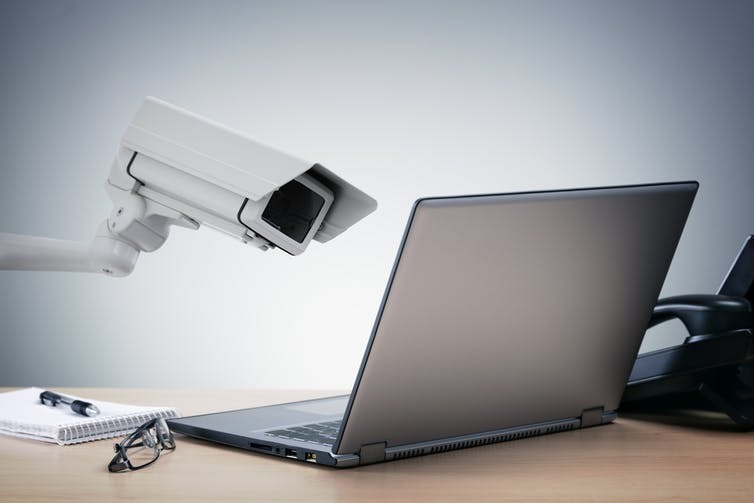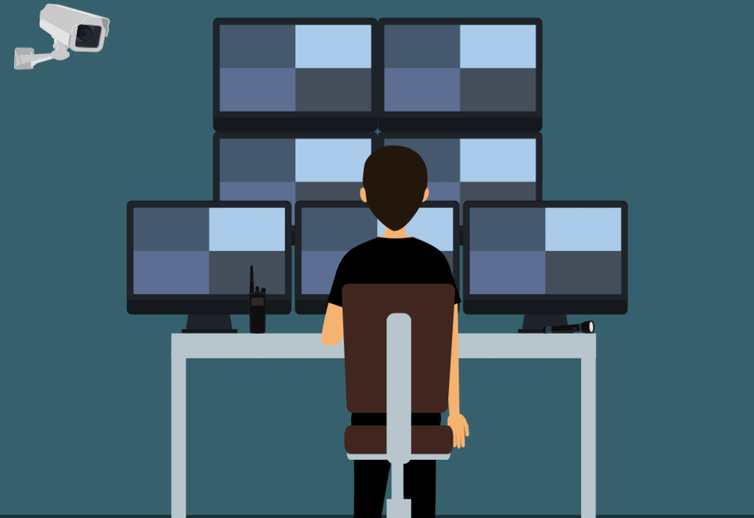Workplace surveillance sounds like the stuff of nightmares, but we are having to get used to it. In a sign of the times, the European Court of Human Rights has just ruled that a supermarket in Barcelona was entitled to fire employees after catching them stealing on CCTV cameras that they didn’t know were installed. This overturned a decision by the court’s lower chamber that the cameras had breached the employees’ human rights.
Yet hidden cameras are almost quaint compared to some of the ways in which employers are now monitoring their staff. They are resorting to everything from software that digitally scans workers’ emails to smart name badges that track their whereabouts. There are even head scanners in development that can monitor workers’ levels of concentration. According to one recent analysis, around half of employers are using some form of non-traditional surveillance on staff, and the numbers are growing fast.

Even tech employees are getting worried – witness Google workers recently accusing their employer of building a browser extension to automatically notify managers about anyone attempting to arrange staff meetings. They claimed that it was intended to prevent staff from potentially trying to form a union. The company denied the accusations.
But if high-tech workplace surveillance is looking more and more unavoidable, what should we do about it? Before we go any further down this road, it’s time to weigh up the possibilities.
The Man is everywhere
Many fear that technologies like wearable tech, digital cameras and artificial intelligence are turbocharging staff monitoring. Some would probably ban such practices outright. After all, most of us want to be free to do our work as we see fit. Yet in reality, employers have always monitored how workers perform. Why ban the new technology and not all such practices? The obvious answer is that we can’t: if all forms of monitoring were banned, how would organisations even function?
Even just to repel the newer forms of workplace surveillance will require huge sustained pressure on politicians and corporations. This seems unlikely, particularly when the culture is already established: most of us are willing to share our lives with the world via social media and allow tech corporations to harvest the data in exchange.
One compromise might be to only allow workplace surveillance where workers opt in. But what would stop employers from insisting that workers sign a consent form as a requirement of the job? You could ban companies from making this mandatory, but it probably wouldn’t work. Workers would still fear that not signing would reduce their job security and cause them to miss out on promotions and other opportunities.

What about regulating the technology? Allowing it only to enhance employee wellbeing and not to monitor productivity, for instance. Such rules might be possible, but they will mean difficult compromises. One option would be to allow employees access to whatever information is gathered on them, for example.
On balance, well designed regulations and constant vigilance against abuses and workers’ rights being eroded is probably about the best we can hope for. Just as you can’t uninvent the atom bomb, you can’t easily put surveillance technology back in its box. If this sounds very stoical, it is also worth reflecting on a few possible consolations.
Diamonds in the dirt?
The firms that develop surveillance software often emphasise the potential for tracking employer wellbeing. We shouldn’t dismiss this too easily. Is it possible that it could catch instances where workers are unhappy or depressed and enable an employer to react appropriately, for example? Could it even spot someone who is suicidal and help instigate a crucial intervention?
Equally, some uses of new technology might actually be less objectionable than existing practices. If AI is being used to monitor your facial expressions or to gauge your attitude from the tone of your voice, it might have fewer biases than a human manager. It won’t make judgements because it is feeling threatened or doesn’t like you and it certainly won’t be lecherous towards you. It might just be that workers can learn to play these things to their advantage.
Also, let’s not forget that the main aim of monitoring employees is to make them more productive. People might actually be willing to sign up for some form of high-tech monitoring if they knew it was likely to improve their productivity. If it showed them ways to make more money for every hour they worked, for example, that might be attractive to them. There might be an analogy here in the ways in which athletes use different monitors to improve their performance.
If people were made more productive in enough workplaces, it should increase national and even global economic productivity. This is what drives economic growth. It should then lead to higher pay, greater profits and more reinvestment in jobs and innovation.

You might counter that these economic gains will be concentrated towards the few, trickling up rather than down. The rest of us might just feel more observed and more stressed. This is certainly a risk. But maybe it could be mitigated if the monitoring also underpinned a more progressive tax system that redistributed the gains from this technology to lower paid workers.
I have argued elsewhere that it would be better to tax people according to their hourly income than their annual earnings. For reasons I explain here, it would allow you to pay higher wages to lower paid workers and to put a greater share of the tax burden on higher paid workers without taking away their incentive to work harder.
One of the main objections to such a system is that it’s hard to check whether everyone is working the number of hours that they claim. Government access to workplace surveillance data could be used to verify this. And this takes me back to my broader point: if we can’t beat the rise of employee surveillance, we must find ways to make the best of it instead. The private sector tends to lead the way in developing and exploiting technology for profit; workplace surveillance could be harnessed to distribute economic gains more equitably.
- is a Tutor in Philosophy and Political Economy, University of Oxford
- This article first appeared on The Conversation




